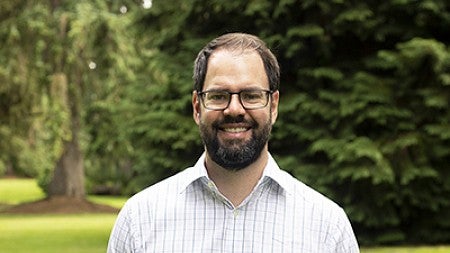
Biology
mfbarber@uoregon.edu | 541-346-4903
Courses: BI484/584 Molecular Evolution; BI399 Immunology & Infectious Disease
In my classes you will:
- Learn with and from peers.
- Interact during exciting, participatory class meetings
I was invited into the Teaching Academy because:
- I participated in a Summer Institute on Scientific Teaching.
In what ways are you working to make your teaching inclusive?
I regularly make use of 'minute-papers' in my courses, where students write and turn in responses to prompts using index cards at the end of class. Sometimes the prompts are assessing knowledge, but often I use this practice to solicit input from my students on ways I can improve their learning. This is a great way to gather input from students who don't normally speak out during class, so everyone has an opportunity to have their ideas heard.
What do you do in terms of professional engagement with the teaching and learning culture on campus or nationally?
One of my courses is part of the UO Science Literacy Program (SLP), and I try to make time to engage with other SLP faculty or join the SLP journal club at least one quarter a year.
In what ways was your teaching in this course research-led—informed by research on how students learn and inflected by UO's research mission?
I have worked to implement the concept of backward design throughout my courses, starting from creating learning goals and objectives and aligning the content of class to those guiding principles. It can be tempting to start designing a course from topics and content, but my colleagues often remind me that there's a lot of research to support the practice of backward design in improving student learning.
What teaching moment led you to this discipline?
A defining moment in my path to becoming a biologist actually happened in my high school chemistry class. Our teacher was explaining the concept that the mass of a tree comes mostly from carbon dioxide in the air. I had spent many days as a kid hiking through the woods near our home, and the idea that "forests come from air" completely amazed me. Today I still love learning about how living things work at the chemical and molecular scale.
